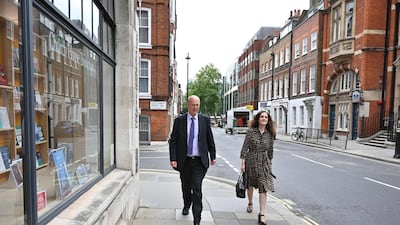The two best known British spies – in popular fiction at least – are James Bond and Johnny English. Bond is the dashing patriotic hero who risks all for Queen and country and gets the job done. Johnny English is the good-hearted but bumbling idiot played for laughs by Rowan Atkinson, the actor who is also famous as Mr Bean. Unfortunately in the real world of oversight of British intelligence services, in the past few days Mr Bean came perilously close to overseeing Mr Bond.
It is a strange story, which sheds light on why party politics means democracies across the world sometimes end up with unqualified and unskilled people in important positions.
The real life Mr Bean is Chris Grayling. He is a Conservative former government minister who achieved notoriety in Europe and the US as Britain’s transport secretary, after botching preparations for Brexit.
The New York Times reported his reputation as "Failing Grayling" after a litany of costly errors.
Mr Bean-like, Mr Grayling actually awarded an expensive ferry contract to a company that had no ferries. Taxpayers ended up paying millions in compensation to another company as part of the scandal. Then, Mr Grayling’s transport department tried to organise a traffic jam of lorries near the key English port of Dover to practise coping with Brexit traffic chaos. It wasn’t a success. Comedians joked Chris Grayling wasn’t even capable of organising a traffic jam.
As justice minister his “reform” of the British probation service was a fiasco, as was his decision to stop books being sent to prisoners in jail. Mr Grayling – said to be a decent bloke – was, just like Mr Bean, also a bit of a joke. His reputation meant that over the past year when I have been speaking at literary festivals and public meetings about why so many people are disenchanted with politics, his name often came up.
“How does Grayling survive?” people would ask. The answer to that has relevance to governments all over the world, from Japan, India and Australia to north America, South Africa and all over Europe. We’ll get an answer in a moment, but first we need to note that Mr Grayling has hit the headlines once more. British Prime Minister Boris Johnson pushed hard for him to chair Britain’s secretive Intelligence and Security Committee.
These are the trusted people who function as the independent oversight body for British intelligence, MI6, GCHQ, the whole James Bond crowd. The idea of putting Mr Bean in charge of Mr Bond led to plenty of amusing newspaper commentary but there is a twist to the tale, which turned into a very British coup.
Another Conservative MP, the well regarded Julian Lewis, secretly secured support from members of the Intelligence and Security Committee and snatched the top job of committee chairman from Mr Grayling’s grasp. MPs clearly had enough of the prime minister rewarding unqualified people for loyalty rather than competence. Privately many Conservative MPs were angry and dismayed.
As if to emphasise Mr Grayling’s unsuitability for a post supervising British intelligence, according to one source, when he failed to get the votes he needed, he “didn’t see it coming.”
This semi-comic saga has a serious point. Some politicians survive and even thrive after repeated failures. The reason goes to the heart of party politics. For some leaders, usually the weaker ones, unquestioning loyalty matters above everything – above ability, imagination and expertise. Chris Grayling has spent years being loyal to whomever happens to be leader of the Conservative party and was repeatedly rewarded with important jobs, even if the British public had to pay the cost.
In 2005 the eminent American historian Doris Kearns Goodwin wrote the Pulitzer prize-winning “Team of Rivals”, which showed how the statesman and former US president Abraham Lincoln filled his government during the US Civil War with the best brains in America, even if it meant there were frequent disagreements.
The British government of Boris Johnson and the Trump administration are among those governments which have done the opposite. In their administrations dissent is not tolerated, loyalty is all. But superficial unity, as a British commentator put it, can turn into a government of “nodding dogs,” unwilling or scared to disagree with the leader.
"Nodding dog" syndrome has contributed to the British government's poor record on handling coronavirus, the Johnson government being forced into a humiliating U-turn on working with the Chinese telecommunications company Huawei, and the likelihood that Britain is blundering towards a nasty version of a no-deal exit from the EU. In this saga it is not Mr Grayling himself who comes out looking worst. It is the Prime Minister himself.
Boris Johnson has become the hapless Mr Bean, bluffing his way on major policy decisions without listening to the views of experts and inevitably not getting things right and being forced to change course. Mr Bean is definitely fun on television, it is just a shame that Mr Bond is unavailable in real life.
Gavin Esler is a journalist, author and presenter


